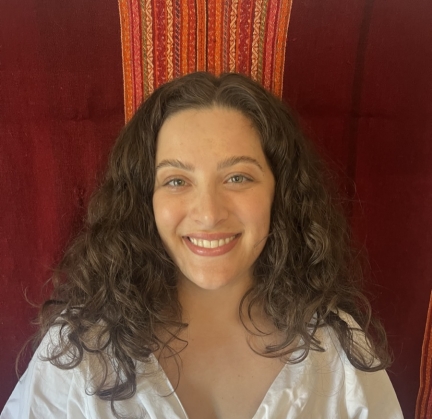Madison Felman-Panagotacos
she/her/ella
Visiting Assistant Professor of Luso-Hispanic Studies

- Office
- Voter Hall 207
- mfelmanpanagotacos@middlebury.edu
- Office Hours
- By appointment
Courses Taught
SPAN 0104
Beginning Spanish II
Course Description
Beginning Spanish II
This course is a continuation of SPAN 0101. Intensive reading, writing, and oral activities will advance students’ proficiency in Spanish in an academic setting. (SPAN 0101 or placement exam) 6 hrs. lect./disc.
Terms Taught
SPAN 0220
Intermediate Spanish II
Course Description
Intermediate Spanish II
A course for students seeking to perfect their academic writing skills in Spanish. The course is also an introduction to literary analysis and critical writing and will include reading and oral discussion of literary texts. The course will also include a thorough review of grammar at a fairly advanced level. This course may be used to fulfill the foreign languages distribution requirement. (SPAN 0201, SPAN 0210, or placement) 3 hrs. lect./disc.
Terms Taught
Requirements
SPAN 0317
Transnational Art and Activism
Course Description
Transnational Art and Activism in Latin America
In this course we will consider how art has the potential to support social movements and political activism, focusing on national and international activism in the Americas in the late 20th and 21st Centuries. From movements like the Zapatista Army of National Liberation to NiUnaMenos, and beyond, the arts have helped to amplify, disseminate, and mediate the ideologies and efforts of these diverse groups. We will broach topics of gender, sexuality, indigeneity, environmental activism, and decolonization, drawing parallels between the strategies used throughout the Hemispheric Americas. The similarities, divergences, and encounters between these cases will allow a deeper reflection on the meaning of activism, solidarity, media, art, and protest. Materials will include visual culture, performance, and music, among other media.
Terms Taught
Requirements
SPAN 0321
Latin American Queer Culture
Course Description
Latin American Queer Culture
In this course we will study LGBTQ cultural productions from Hispanic Latin America, including fiction, poetry, film, visual art, and theory, covering works from the Southern Cone, the Andes, the Caribbean, Central America, and Mexico. We will pay special attention to the uses of queerness in portrayals of ideological conflict: when and how does queerness become an element of dissent, an ethic of resistance, a critique of normativity, a marketable quality. Topics will include indigenous sexualities pre-Conquest, the impact of colonial rule, homonationalism, the criminalization of homosexuality, queer activism, and sexuality from transgender//travesti/ and nonbinary perspectives.
Terms Taught
Requirements
SPAN 0344
Reproduction and Maternity
Course Description
Reproduction, Maternity, and Abortion in Latin America
Motherhood is a topic that has long been dismissed as trivially feminine and therefore understudied as a literary theme. However, during the 21st Century, there has been a boom of Latin American literature with maternal themes. In this course, we will consider essays, novels, and poetry with themes such as pregnancy, miscarriage, fertility, abortion, family planning, birth, adoption, and communal motherhood practices. The goal is to give students the analytic tools to understand the conditions that gave rise to this trend and how these works invoke and/or resist essentialist and patriarchal notions of motherhood. Texts may include Margaret Gibson’s Queering Motherhood, Linda Kerber’s “The Republican Mother,” Lina Meruane’s Contra los hijos, Pilar Quintana’s La perra, and Isabela Zapata’s In vitro.
Terms Taught
Requirements
SPAN 0346
Rewriting National Fictions
Course Description
Rewriting National Fictions: Adapting Citizenship in Foundational Narratives
How do new nations consolidate their citizenry under a collective identity with shared traits, beliefs, and values? How do contemporary citizens grapple with the constraints on the ideal citizen? In this course we study the “foundational fictions” that united Latin American countries after their independence from Spain, using Argentina as our principal case study. We analyze the implications of these narratives, namely who is excluded? To answer this question, we perform comparative readings of foundational fictions and their reinterpretations that seek to identify and rectify these exclusions. Texts include Benedict Anderson’s Imagined Communities; Doris Sommer’s Foundational Fictions; José Hernandez’s Martín Fierro and Gabriela Cabezón Cámara’s Las aventuras de la China Iron; Domingo Faustino Sarmiento’s Facundo and Ricardo Piglia’s Respiración artificial.
Terms Taught
Requirements
SPAN 0500
Independent Study
Course Description
Independent Study
The department will consider requests by qualified juniors and senior majors to engage in independent work. (Approval only)
Terms Taught
Academic Degrees
Ph.D. in Hispanic Languages & Literatures, UCLA (2023)
- Graduate Certificate in Gender Studies
- Graduate Certificate in Writing Pedagogy
M.A. in Spanish, UCLA (2018)
B.A. in Spanish & Latin American Studies, Washington University in St. Louis (2016)
